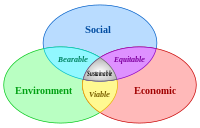
Photo from wikipedia
The Inclusive Wealth Index (IWI) is a stock-based comprehensive indicator used to evaluate sustainability based on the wealth of nations, including a finer scale that considers the wealth of regions,… Click to show full abstract
The Inclusive Wealth Index (IWI) is a stock-based comprehensive indicator used to evaluate sustainability based on the wealth of nations, including a finer scale that considers the wealth of regions, in which these indicators are required for governance in the administrative regional hierarchies to achieve Sustainable Development Goals. However, few studies have applied the measure to finer-scale wealth relative to the national level. In this paper, we fill the gap by examining the IWI in all prefectures in Japan, where sustainability is increasingly being lost as a result of depopulation, an aging population, and the excessive burden of environmental regulations. We determined that all regions in Japan maintained sustainability from 1991 to 2000. Then, regional sustainability was lost in 8 prefectures from 2001 to 2005 and in 28 prefectures from 2006 to 2010. This trend is consistent with those found in previous studies, though more severe. The decreasing wealth growth is caused by the increasing damage to health capital, mainly in rural areas, whereas produced capital has had positive effects but has not mitigated the damage. Finally, we illustrate how this index can be applied to evaluate projects in response to the intense debate in regional public policy for rural sustainability through a case study of seawalls as a recovery project in the wake of the Great East Japan earthquake.
Journal Title: Sustainability Science
Year Published: 2017
Link to full text (if available)
Share on Social Media: Sign Up to like & get
recommendations!